

It’s become an unsettling fact of political life that as election turnouts dwindle, campaign spending skyrockets. Los Angeles’ recently concluded school board races, which drew a paltry 7.6 percent of potential voters, underscored this point. Ref Rodriguez, who unseated the District 5 incumbent, received most of the $2.2 million contributed by political action committees (PACs) controlled by the California Charter Schools Association Advocates. Rodriguez has co-created several charter schools and his backers, unsurprisingly, came from that community. Among the familiar local names of extreme wealth and influence were Eli Broad, Richard Riordan and William Bloomfield. Equally familiar to followers of school privatization were more distant funders such as Netflix CEO Reed Hastings, Walmart heir Jim Walton, Laurene Powell Jobs, the Gap Inc.’s Fisher family members and former New York Mayor Michael Bloomberg.
Rounding out Rodriguez’s cascade of thousand-dollar checks were names associated with high-powered investment firms,
» Read more about: Is Voter Turnoff Inviting a Progressive Rollback? »
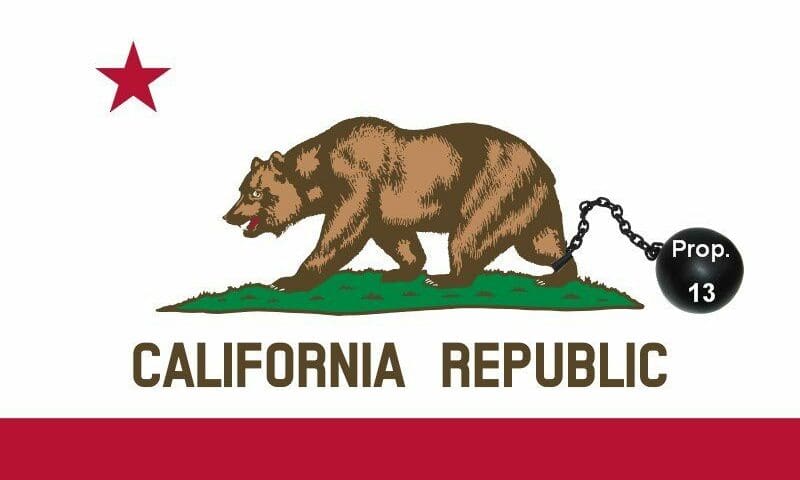

California is earthquake country but one seismic shift rumbling through the state won’t require bottled water and a three-day food supply.
That would be the political and demographic groundswell toward challenging elements of Proposition 13, the property tax measure passed by California voters in 1978 by a landslide and which has been considered untouchable ever since.
“Prop. 13 has been a contentious part of the political landscape for 40 years,” says John Kim of the Advancement Project, one of the organizations comprising Make It Fair, a coalition of 22 statewide organizations and 200 endorsers seeking Prop. 13 reforms.
The watershed initiative became synonymous with protecting the little guy after homeowners’ property tax rates grew so high in the 1970s that people on fixed incomes couldn’t afford to pay them. But from the start, a piece of the measure has protected the not-so-little-guys.


Emeryville, California is more than a brief Amtrak stop across the bay from San Francisco. On Tuesday evening all five Emeryville City Councilmembers approved an ordinance that increases the minimum wage for workers employed at small firms to $12.25 an hour, effective July 1. Employees at Emeryville companies with more than 55 employees, such as Home Depot and Ikea, will earn a minimum wage of $14.44 an hour, also to begin July 1.
“This is a momentous occasion for the city of Emeryville,” Jennifer Lin, deputy director of the East Bay Alliance for a Sustainable Economy, told Capital & Main by phone. “Many of the city councilmembers in their deliberations spoke about the need to address income inequality, to give workers a leg out of poverty.”
California’s current hourly minimum wage is $9, an increase of $1 over 2014. Meanwhile, the Golden State’s rate of poverty in 2013 was 23.4 percent,
» Read more about: Emeryville Joins Movement to Raise Minimum Wage »


Remunicipalization is big word for a simple concept: It’s the process of bringing a formerly privatized service or asset back under public control. For residents and taxpayers, remunicipalization is often the logical conclusion after private water corporations fail to deliver on their promises. For corporations like Veolia and Suez that earn profits from taking over municipal water systems, remunicipalization is a major threat to their business model. And that threat is growing every year.
According to a new book from the Transnational Institute and other organizations, the rate of remunicipalization is “accelerating dramatically”:
“Over the last 15 years, 235 cases of water remunicipalization have been recorded in 37 countries, impacting on more than 100 million people. Moreover the pace of remunicipalization is accelerating dramatically, doubling in the 2010-2015 period compared with 2000-2010.”
City leaders and residents across the globe are reclaiming their water systems from private profiteers and ensuring that access to clean water remains a human right for every citizen.


It happens every spring: The start of baseball season and the Chamber of Commerce’s assault on legislation designed to improve the lives of Californians – many of them our most vulnerable residents. The CalChamber lobbies against legislation year-round, of course, but brings out its biggest bat in the form of its Job Killer list – a lineup of bills that are demonized as wasteful, overreaching, unfair, etc. The list is a remarkably effective tool and accounts for the chamber’s astronomically high batting average – last year it went 25 for 27 in its efforts to stop “job-killing” legislation. Many a bill that seemed a shoo-in to become law has suddenly found itself permanently stuck in some committee, or vetoed whenever the Chamber persuades the governor to play the role of Mr. September for corporate interests.
Last week the CalChamber released its “preliminary” list of Job Killers.
» Read more about: CalChamber's 'Job Killers' List Returns »


As comprehensive immigration reform stalls along party lines in Washington, D.C., state Democrats are taking action in Sacramento. Backed by an assortment of coalition partners, California’s blue lawmakers have authored 10 new immigration bills (four in the Senate and six in the Assembly) to better the lives of two million undocumented individuals — five percent of California’s population.
As a thunderstorm with hail and lightning soaked a drought-parched Sacramento, Senate President Pro Tem Kevin de León (D-Los Angeles) and Assembly Speaker Toni G. Atkins (D-San Diego) announced the “Immigrants Shape California” reform measures. They would increase the consumer, civil, criminal, health-care and labor rights of undocumented households.
“We are doing the work of the federal Congress,” said de León during a late-morning news conference inside the state Capitol. “This is our reaction to their lack of action.”
“With these bills,” said Atkins, “California will show the practical, humane and forward-thinking leadership that can move the needle on a national discussion.” To this end,
» Read more about: Curtain Raised on State Immigration Bills »
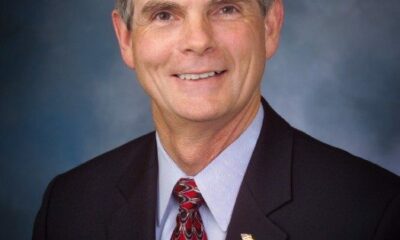
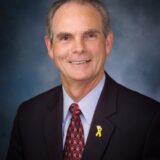
Last month former San Jose mayor Chuck Reed took the first step toward offering a promised draft of a 2016 public pension cutting initiative that, he has hinted, will target the California Public Employees’ Retirement System. CalPERS manages the retirement and health benefits for more than 1.6 million California public employees, retirees and their families. Reed tried to get a pension initiative on the ballot in 2014, only to withdraw the measure when state attorney general Kamala Harris assigned it a ballot description that Reed and his allies believed would hurt their chances with the electorate.
This time, however, Reed could find his campaign in danger from an unexpected source – conservative allies who might be worried that his initiative’s very presence on the ballot will draw huge numbers of liberal and union voters – who would then also vote against conservative candidates running for local and state office.
» Read more about: Pension Cutters' 2016 Ballot Obstacle: Voters »


As this series has made clear, “The California Chasm” is a challenge that threatens to transform the state into a shadow of its former self. Once a place where people came together to realize fortunes, remake their lives and attain their piece of the American Dream, we have become a state saddled with sharp differences in social, economic and health outcomes due to race, place and class.
This is an encore posting from our State of Inequality series
The resulting division is damaging to our sense of community but it also leaves the potential of our residents untapped. With research increasingly demonstrating that more equitable strategies can produce more sustainable growth, we need to create a conversation about how California can lead the nation not in inequality but in opportunity.
We have the know-how —
» Read more about: Twelve Ways to Reverse Inequality and Close the "California Chasm" »
I recently interviewed one of the country’s unabashed progressive leaders, New York Mayor Bill de Blasio. Our discussion ranged from Ronald Reagan’s legacy to the failures of contemporary Democrats to stand up for their values. “We have an income inequality crisis in this country that will endanger the future of the entire United States of America,” de Blasio told me. We present here the fourth in a series of clips from that interview. (Full transcript here.)
[divider]
Danny is communications director at LAANE and the publisher of Capital and Main. He has led LAANE’s communications efforts for the past decade. He has attracted national media attention for numerous LAANE projects, including the successful effort to stop Wal-Mart from building a superstore in Inglewood and the drive to bring living wages to hotel workers in Santa Monica.
Read more articles by Danny Feingold
» Read more about: Watch Now: Bill de Blasio on Economic Inequality »
I recently interviewed one of the country’s unabashed progressive leaders, New York Mayor Bill de Blasio. Our discussion ranged from Ronald Reagan’s legacy to the failures of contemporary Democrats to stand up for their values. “We have an income inequality crisis in this country that will endanger the future of the entire United States of America,” de Blasio told me. We present here the third in a series of clips from that interview. (Full transcript here.)
[divider]
Danny is communications director at LAANE and the publisher of Capital and Main. He has led LAANE’s communications efforts for the past decade. He has attracted national media attention for numerous LAANE projects, including the successful effort to stop Wal-Mart from building a superstore in Inglewood and the drive to bring living wages to hotel workers in Santa Monica.
Read more articles by Danny Feingold » Read more about: Watch Now: Bill de Blasio on Progressive Movements in American Cities »
I recently interviewed one of the country’s unabashed progressive leaders, New York Mayor Bill de Blasio. Our discussion ranged from Ronald Reagan’s legacy to the failures of contemporary Democrats to stand up for their values. “We have an income inequality crisis in this country that will endanger the future of the entire United States of America,” de Blasio told me. We present here the second in a series of clips from that interview. (Full transcript here.)
[divider]
Danny is communications director at LAANE and the publisher of Capital and Main. He has led LAANE’s communications efforts for the past decade. He has attracted national media attention for numerous LAANE projects, including the successful effort to stop Wal-Mart from building a superstore in Inglewood and the drive to bring living wages to hotel workers in Santa Monica.
Read more articles by Danny Feingold » Read more about: Watch Now: Bill de Blasio on the Current Economic Crisis »


Occasionally, President Barack Obama reminds us that he was once a community organizer.
In his interview last Monday night with BET News, Obama said that he had invited some people who have been organizing protests against police misconduct to meet with him at the White House last week.
“Because the old adage, power concedes nothing without a fight — I think that’s true,” Obama said.
Obama was closely paraphrasing a statement by the great abolitionist Frederick Douglass that is well-known among community organizers and activists: “Power concedes nothing without a demand.”
This is not a phrase that most politicians would be familiar with. Obama probably first heard Douglass’ words during his three years as a community organizer in Chicago during the 1980s. Douglass’ famous one-liner was actually part of a speech he gave on August 3, 1857 in Canandaigua,
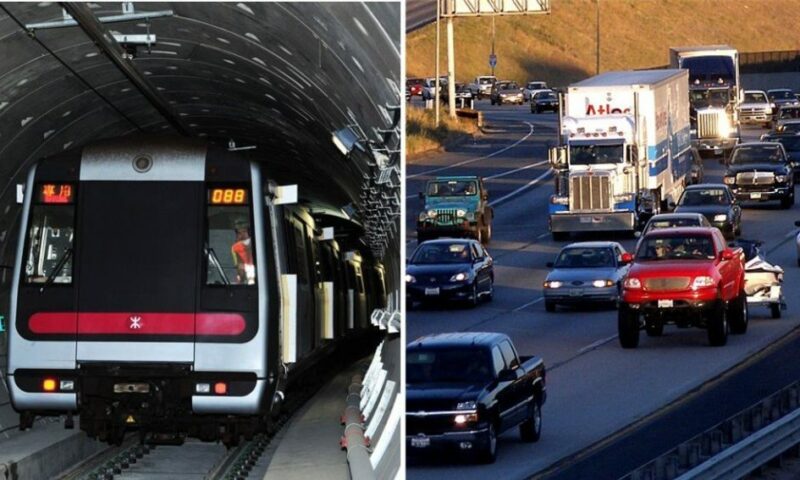

When people think of Los Angeles, what comes to mind first? Maybe Disneyland, Hollywood for sure, perhaps our proximity to the beach, but definitely traffic—the infamous Los Angeles freeway traffic. Is there ever an answer to this omnipresent problem?
Over this past summer, I had the privilege of spending time in Hong Kong, thanks to the Henry Luce Foundation and the Urban Environmental Policy Institute at Occidental College. For six weeks, I explored the area while researching the political and education underpinnings of rooftop farms in Hong Kong. When I made the transition back to L.A., I found myself reflecting on different aspects of life, including food justice and transportation, and making unexpected comparisons between the two places.
Hong Kong has a population of more than seven million people and is one of the most world’s densely populated areas, with about twice the population of Los Angeles.
» Read more about: Hong Kong to L.A.: Reflections on Transit Transformation »
I recently interviewed one of the country’s unabashed progressive leaders, New York Mayor Bill de Blasio. Our discussion ranged from Ronald Reagan’s legacy to the failures of contemporary Democrats to stand up for their values. “We have an income inequality crisis in this country that will endanger the future of the entire United States of America,” de Blasio told me. We present here the first in a series of clips from that interview. (Full transcript here.)
» Read more about: Watch Now: Bill de Blasio on the Leadership Role of Cities »
Steve Clemons is Washington editor-at-large for The Atlantic, whose spin-off site, CityLab, covers new ideas and issues facing urban metro areas worldwide. Each year CityLab convenes a gathering of global city leaders in person to discuss innovative ideas and projects that are emerging in urban communities. This year CityLab’s conference was held at the Ace Hotel in downtown Los Angeles. Shortly afterward, Capital & Main spoke to Clemons.
» Read more about: Up from Gridlock: The Atlantic’s Steve Clemons on Government »
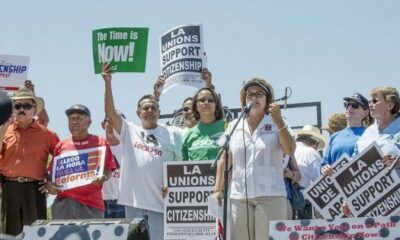

Nearly a decade ago, L.A. labor leader María Elena Durazo organized the Immigrant Workers Freedom Ride, a national caravan that brought immigrants and their supporters around the country to Washington, D.C., to push for immigration reform. In the ensuing years, there has been much talk but no action on extending legal protections to the country’s millions of undocumented immigrants.
All that changed yesterday, when President Barack Obama announced that he would sign an executive order granting temporary protection to as many as 5 million immigrants. Advocates were elated, while critics sharpened their knives and prepared for a PR counteroffensive.
Capital & Main spoke by phone with Ms. Durazo this morning shortly after she arrived in Las Vegas to join the President as he signs the executive order into law.
Capital & Main: What do you think of President Obama’s executive order granting temporary protection to undocumented immigrants?
» Read more about: Immigration Advocate María Elena Durazo on Obama’s Executive Order »
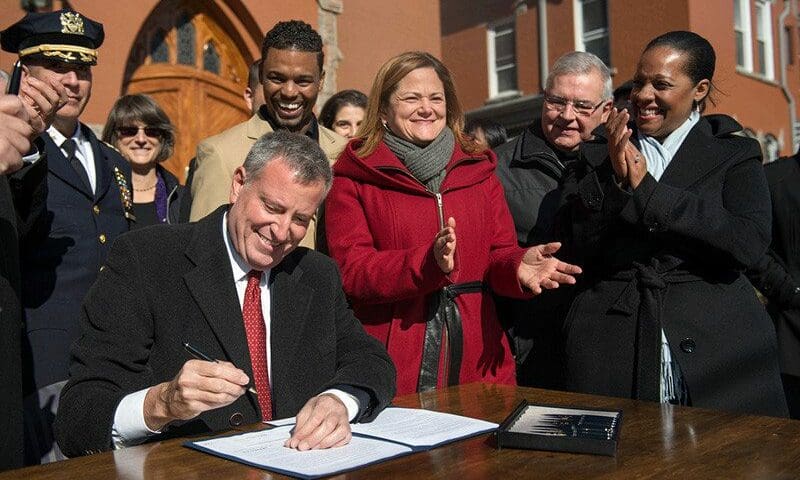
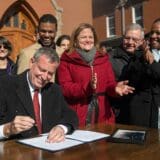
Capital & Main: Do you see risk in Democrats running away from a populist progressive agenda?
Mayor Bill de Blasio: Absolutely. I think the biggest development we saw [in the midterm election] was Democrats not standing up for the ideals of the Democratic Party, not talking to the economic realities of our people, not being willing to offer real progressive solutions. I think there’s another model of Democrats who actually addressed these issues, who were willing to take on big corporations, who were willing to challenge the status quo, who were willing to ask those who are wealthy to pay their fair share, who were willing to talk about how we create living wage jobs and better benefits….
People are looking for answers to what is now a fundamental structural economic crisis. The middle class has been collapsing, people’s earning power has been declining rapidly…. I love that the conventional wisdom [about the recent election] is about a conservative tidal wave.


Like most political junkies, I have been so focused on the recent election – national, statewide and local – that I have not been thinking much further. But the vicissitudes of politics always bring me back to the core issues. Once the up and down results are in, I remember again that the electoral process amounts to only a part of what makes a democracy work.
Yes, we must have listening and sympathetic ears among those elected to office. Yes, it helps to have people from the margins brought into the arenas of decision making and sitting in the rooms where deals get made. But without advocates for the issues that matter, however much money gets spent and whoever is elected remains irrelevant.
My loneliest moment as an elected official came about three months into my first term as a member of the Santa Monica City Council. We were deciding on development projects one at a time because we had scrapped the laissez faire rules,
» Read more about: The Heart of the Matter: What Counts After Election Day »
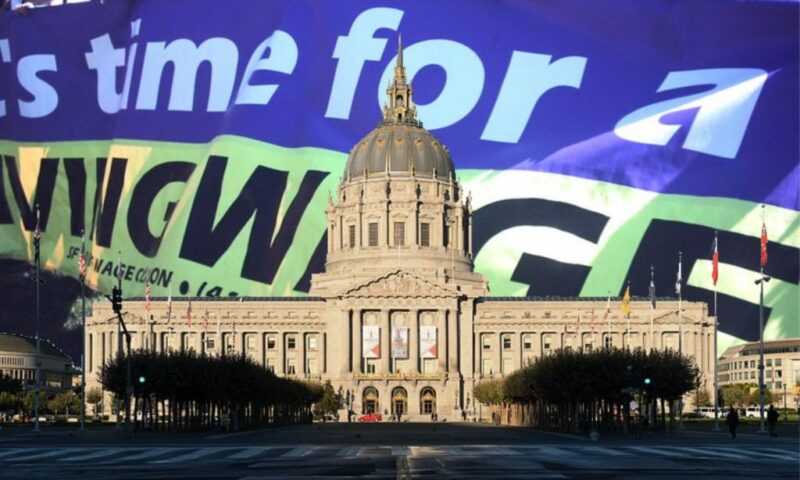
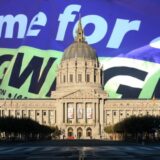
On Tuesday San Francisco voters approved by a 77 to 23 percent margin Proposition J, which will increase the city’s minimum wage from the current $10.74 per hour to $12.25 per hour by May 1, 2015. The city’s minimum wage would climb to $13 per hour by July 2016; to $14 per hour by July 2017 and $15 per hour by July 2018.
“Prop. J will provide a much needed raise to $15 per hour for 140,000 of the lowest paid workers in our city,” Gordon Mar, executive director of Jobs with Justice, San Francisco, told Capital & Main. “Prop. J will also raise the bar nationally for minimum wage policies.”
The “Fight for $15” to gain a higher minimum wage for workers began in Seattle, Washington. Voters there, with Socialist Alternative city council member Kshama Sawant spearheading a grassroots movement,
» Read more about: Big Bay Area Victories for Living Wages »


“A lot of people want to make changes but they don’t know where to go,” said Tiesha Speights on the afternoon of Election Day. So Tiesha went to the people, knocking on doors in Long Beach on behalf of Proposition 47, the California ballot initiative written to reduce the penalties for low-level crimes that involve less than $950, from felony levels to misdemeanors. Speights had been hustling block-by-block for the “Yes on 47” campaign for three weeks. Her work and the canvassing efforts of countless others paid off – Prop. 47 would pass handily Tuesday by a 58.5 percent to 41.5 percent margin.
Speights deeply connected with the measure, which permits re-sentencing for those currently serving a prison term for any of the offenses that the initiative reduces to misdemeanors, including forgery, theft, minor drug offenses and shoplifting. Some 10,000 inmates would be eligible to have their sentences reconsidered.
» Read more about: Proposition 47: Winning One Door at a Time »